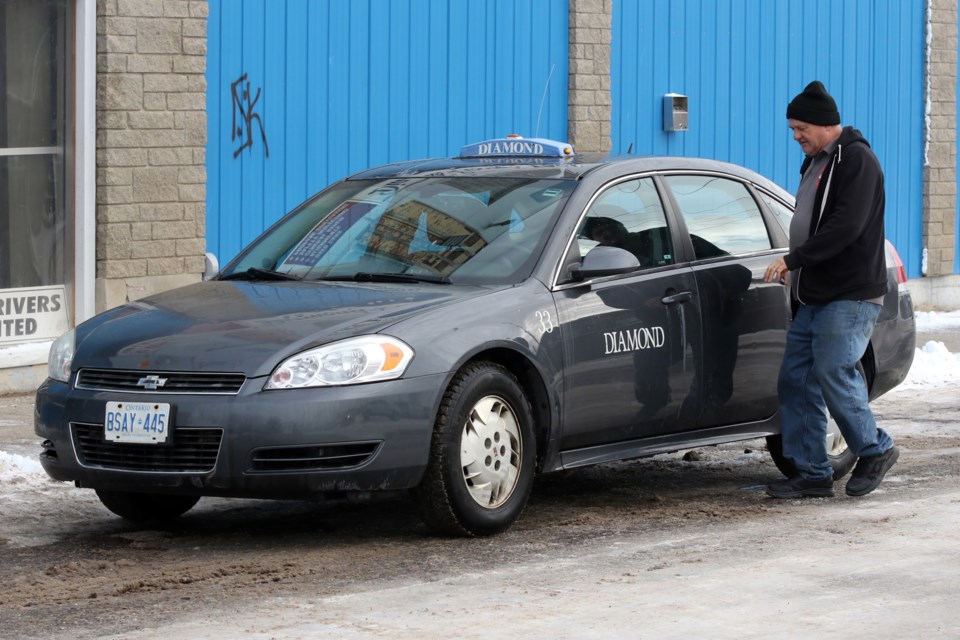THUNDER BAY – An overhaul of the city’s taxicab and vehicle for hire industry that has been years in the making inches closer to fruition but remains shy of the finish line.
The reformed bylaw, which would eliminate set rates for taxi companies and get rid of the limit on licences, was approved by Thunder Bay city council during Monday night’s committee of the whole meeting. The bylaw still needs to be ratified at a future council meeting, expected in the next two to three months, before being enacted.
Coun. Brian McKinnon, the point man for a subcommittee tasked with drafting the legislation, said the group has met more than 40 times over the past few years.
“In that meantime – the four years – there has been enormous change in the industry. Essentially, when we started there were two providers,” McKinnon said. “Since then, we have nine providers. In other words, we have seven new players and they are playing in a different environment.”
The process to develop a new bylaw began in 2012 when the Thunder Bay Police Services Board, which oversaw taxi regulation, initiated a review of the existing bylaw. The police services board formally requested the city to assume the responsibility in 2014.
The introduction of ridesharing companies into the Thunder Bay market slowed the process as administration attempted to create a level playing field for both the existing taxicab companies and the new application based entities.
The bylaw would drastically alter the vehicle for hire landscape, as Thunder Bay would join Barrie as the only two known Ontario municipalities to eliminate rate regulation and allow providers to set their own fares. Other significant changes include reducing licensing fees to encourage market entry and establishing requirements for business licence holders to have 10 per cent of their fleet be accessible vehicles.
“We’re definitely talking about opening the market up so people who want to go into business can and can charge what they deem necessary to charge for the service,” city licensing and enforcement manager James Coady said.
“What we really think we’re focusing on is security, accessibility, safety for customers. Not the rates and not the number of vehicles out on the road. We’re also trying to regulate the other entrants to the market.
Coun. Trevor Giertuga, who along with Coun. Iain Angus were the only two to oppose the bylaw, said he was concerned about the public backlash that could be unleashed from letting each entity determine their own fares.
There’s a perception the rates are already too high, Giertuga said.
“When I hear admin say they’re more concerned about the regulations than the rates, that concerns me. When I hear admin say they don’t know what will happen until they remove this and see what happens and where it unfolds, that scares the heck out of me,” Giertuga said.
“Why don’t we wait for the only city in the province to complete their pilot project and see what happens. Instead we’re going to dive in. You might drown, but we’re going to drown with you. This is completely (speculative) and unproven whether this is going to decrease the rates. I’m not prepared to roll the dice with our most vulnerable people – seniors, children and people who don’t have vehicles and can’t afford vehicles or insurance.”
Craig Murphy, manager of the Student Transportation Services of Thunder Bay consortium that represents three local school boards, asked council to delay implementation of the bylaw to July 1, 2018. The boards last school year used more than 24,000 taxi trips at a cost of $460,000 for students with special needs unable to travel by bus or enrolled in programs that operate outside of normal busing times or locations.
Changes to the bylaw could increase costs by nearly 60 per cent and force the consortium to undertake a competitive bidding process, which could take up to eight months to complete, Murphy said.
“We do have the numbers for other consortiums across the province who are using other services other than taxis for providing the specialized transportation and their costs are significantly higher than we are,” Murphy said. “We are enjoying some of the lowest rates in the province for our special needs transportation currently. Certainly, if we go to procuring services otherwise we strongly feel it would have a significant impact.”
A final decision on whether council will go ahead with the new bylaw won’t take place until the New Year.
